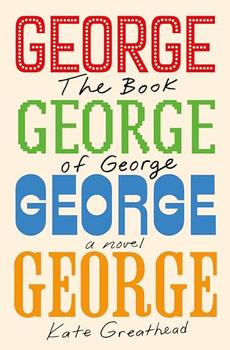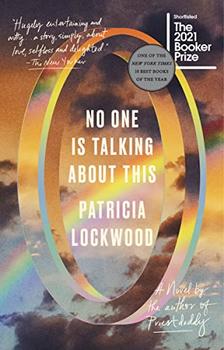Summary | Excerpt | Reading Guide | Reviews | Beyond the book | Read-Alikes | Genres & Themes | Author Bio

A Novel
by Kate GreatheadFrom the author of the critically acclaimed Laura & Emma comes a The Love Affairs of Nathaniel P. for our times: Kate Greathead's razor-sharp but big-hearted excavation of millennial masculinity, The Book of George.
If you haven't had the misfortune of dating a George, you know someone who has. He's a young man brimming with potential but incapable of following through; sweet yet noncommittal to his long-suffering girlfriend; distant from but still reliant on his mother; charmingly funny one minute, sullenly brooding the next. Here, Kate Greathead paints one particular, unforgettable George in a series of droll and surprisingly poignant snapshots of his life over two decades.
Despite his failings, it's hard not to root for George at least a little. Beneath his cynicism is a reservoir of fondness for his girlfriend, Jenny, and her valiant willingness to put up with him. Each demonstration of his flaws is paired with a self-eviscerating comment. No one is more disappointed in him than himself (except maybe Jenny and his mother). As hilarious as it is resonant and as singular as it is universal, The Book of George is a deft, unexpectedly moving portrait of one man―but also countless others.
Greathead cleverly plays on the idea of the picaresque hero, a loveable rogue satirizing society's mores as he slips from one adventure to the next. George's picaresque adventures cut through some of the great social upheavals of the last two decades—Occupy Wall Street, MAGA, the MeToo movement—but the novel's fast-paced episodes mean that too often these feel more like superficial waypoints through the 21st century than cultural moments worthy of true reflection. Greathead's strengths instead lie in the witty back-and-forth of her dialogue and the unspoken conflict tangled beneath. Indeed, tragedy underlies the "sitcom-level banter" that comes so naturally to George; having lost his father at an early age, grief has led him to retreat into himself. But Jenny too is no stranger to childhood trauma, and her continued thoughtfulness and determination feel like a pointed rebuttal. Why does she thrive while her boyfriend wallows in lazy self-absorption?..continued
Full Review
 (715 words)
(715 words)
(Reviewed by Alex Russell).
 In The Book of George, Kate Greathead covers the life of her eponymous hero in 14 chapters depicting key moments from his first 40 years. In doing so, she draws on elements of the picaresque, an episodic literary genre in which an outsider moves from adventure to adventure while satirizing the society of the day.
In The Book of George, Kate Greathead covers the life of her eponymous hero in 14 chapters depicting key moments from his first 40 years. In doing so, she draws on elements of the picaresque, an episodic literary genre in which an outsider moves from adventure to adventure while satirizing the society of the day.
The picaresque is one of the earliest forms of the novel. It originated in 16th-century Spain during the country's "Golden Age," and is believed to have drawn from diverse influences such as Apuleius's The Golden Ass (the only Roman novel to survive in its entirety) and the Arabic Maqāmāt literature of Islamic Spain. In time, the genre evolved as a counterpoint to existing chivalric romance. Instead of ...

If you liked The Book of George, try these:

by Sally Rooney
Published 2025
An exquisitely moving story about grief, love, and family―but especially love―from the global phenomenon Sally Rooney.

by Patricia Lockwood
Published 2022
From "a formidably gifted writer" (the New York Times Book Review), a book that asks: Is there life after the internet?
If there is anything more dangerous to the life of the mind than having no independent commitment to ideas...
Click Here to find out who said this, as well as discovering other famous literary quotes!